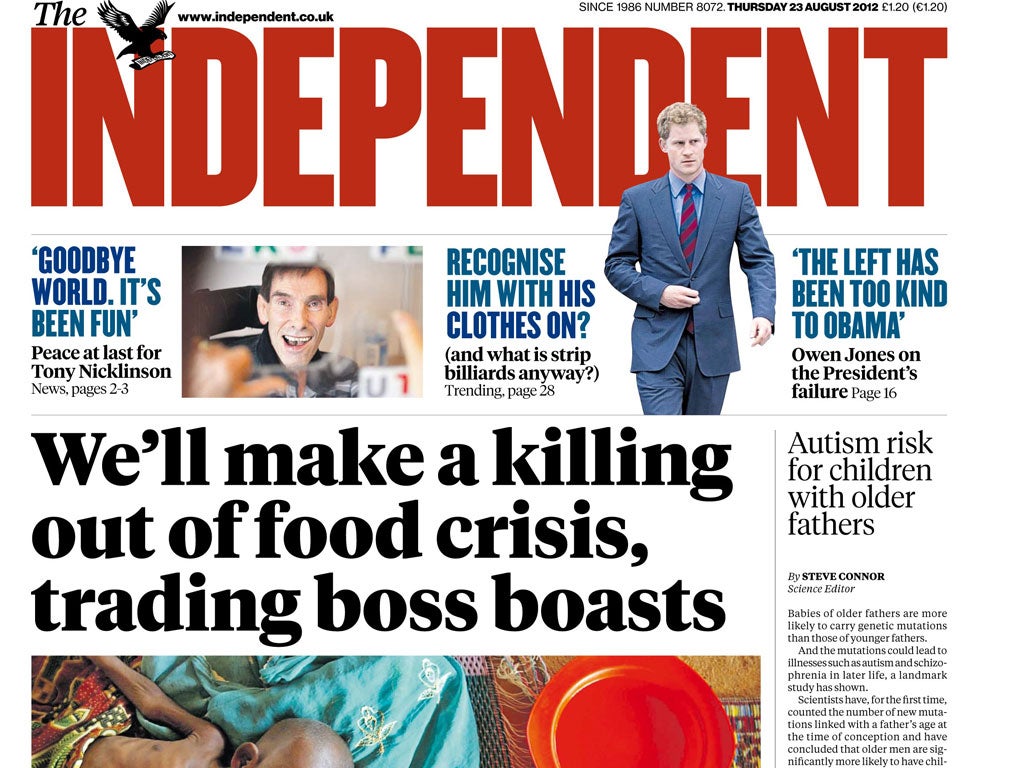Vatican urges G20 to convene crisis summit on food prices
Holy See attacks grain speculators for profiting from the most poor and needy on the planet

Your support helps us to tell the story
From reproductive rights to climate change to Big Tech, The Independent is on the ground when the story is developing. Whether it's investigating the financials of Elon Musk's pro-Trump PAC or producing our latest documentary, 'The A Word', which shines a light on the American women fighting for reproductive rights, we know how important it is to parse out the facts from the messaging.
At such a critical moment in US history, we need reporters on the ground. Your donation allows us to keep sending journalists to speak to both sides of the story.
The Independent is trusted by Americans across the entire political spectrum. And unlike many other quality news outlets, we choose not to lock Americans out of our reporting and analysis with paywalls. We believe quality journalism should be available to everyone, paid for by those who can afford it.
Your support makes all the difference.The G20 was under growing pressure to call an emergency summit on global food prices last night as the Vatican accused grain speculators of "hampering the poorest and neediest".
The worst drought in 50 years in the United States and poor harvests in Central Asia have raised fears of global food riots, and led to increased scrutiny of commodities traders who profit by exploiting volatile prices.
Yesterday, South Korea's president Lee Myung-bak wrote to G20 members calling for joint action to stabilise grain prices, warning that the soaring cost of food "threatened the survival of the poor and vulnerable of developing countries". The International Grains Council warned that the world's maize stocks were on course to hit a nine-year low, with Russia's wheat crop falling to levels last seen during the major drought of 2010.
The United Nations and key member states are now urging the presidency of the G20, held by Mexico, to schedule a mini-conference on the global food price crisis before the end of the year. The organisation could summon its Rapid Response Forum, which was created at the G20 summit in Paris last year to prevent market crises.
International aid agencies are urging the G20 to implement an already agreed "road map" that they believe would help curb the negative influence of agricultural commodity markets.
Yesterday the Vatican's permanent observer at the UN in Geneva, Archbishop Silvano Tomasi, claimed "market activities" such as arbitrage [buying and selling goods to exploit price differences] and the use of derivatives trading in grain supply chains, are "hampering the poorest and the neediest".
In a Vatican Radio interview, Archbishop Tomasi said that the worsening crisis in food price volatility "will have social consequences". The archbishop said: "Poor countries require not only urgent help, but also investment to change the realities of life and make them more human."
The moral pressure from the Vatican on the G20 follows widespread condemnation of giant commodities trading companies for regarding drought and allied global food insecurity as profitable business opportunities.
The comment made this week by Glencore's director of agriculture products, Chris Mahoney, that "high prices, lots of volatility, a lot of dislocation, tightness and a lot of arbitrage opportunities" made a "good" environment for Glencore, prompted the UN and leading aid agencies to call for fast-track reform of the international regulations.
However, Glencore insisted that it is fulfilling global demand by getting commodities to the places that need them most.
Join our commenting forum
Join thought-provoking conversations, follow other Independent readers and see their replies
Comments